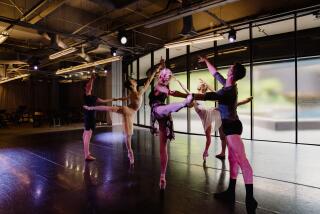Quick Wit on Their Feet
Apart from showcasing the company’s technical and stylistic excellence, the program Saturday by Hubbard Street Dance Chicago displayed facets of contemporary musicality: surprising ways choreographers use preexisting scores and recordings.
Dancing at the Irvine Barclay Theatre, the Streeters repeated David Parsons’ “The Envelope” and Harrison McEldowney’s “Group Therapy,” seen last week in Glendale. These broadly comic works undermine their accompaniments by parodying either their florid emotionalism (Parsons using Rossini overtures) or the content of their lyrics (McEldowney using such pop songs as “Treat Me Rough”). In the same category but at a higher level: Jiri Kylian’s “Six Dances,” which makes Mozart an ally in lampooning aristocratic 18th century manners, ballet partnering conventions and the violent plots of grand opera. You could even say it calls into question all the pretensions of classic Euro-culture.
Punctuated by the entrances of two enormous black ball gowns that move by themselves and soon swallow up members of the cast, “Six Dances” packs an amazing amount of detailed, breakneck motion into 14 minutes--ending with a mock finale garnished with smoke effects, a cascade of soap bubbles and a sheepish shrug from the eight dancers as if asking whether anyone really approves of this sort of nonsense.
They do, at least when danced with such spectacular prowess by a cast led by the exemplary David Gomez and Laura Haney Gomez. And the same audience will happily follow Hubbard paragons Jennita Russo and Joseph Mooradian through the duet “To Have and to Hold,” even though choreographer Kevin O’Day has set their loving, playful interaction against somber, buzzing sound-textures composed by Guy Klucevsek. As it happens, this almost defiant anti-musicality guards the piece against sentimentality by placing a love relationship in a modern landscape with no place for traditional sweetness or lyricism.
The juxtaposition of super-refined modern dance and throbbing folkloric music falls apart in Nacho Duato’s “Rassemblement” (The Gathering), initially another of his gorgeously sensual social abstractions--here set to Haitian songs by Toto Bissainthe. But suddenly the work shifts into dance-drama, showing a man trapped and brutalized, women mourning and, at the end, confrontational stances and rebellion in sync with the soundtrack’s cry for liberty.
Maybe Duato wanted to lull the audience and then deliver a pithy statement about oppression. Certainly Ron De Jesus and Cheryl Mann dance powerfully in the central roles. But the result leaves the protest message ungrounded and the lush, spontaneous style of the opening sections undeveloped--unsatisfying in two different ways.
More to Read
The biggest entertainment stories
Get our big stories about Hollywood, film, television, music, arts, culture and more right in your inbox as soon as they publish.
You may occasionally receive promotional content from the Los Angeles Times.










